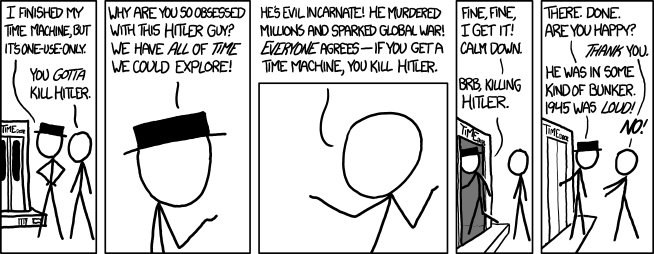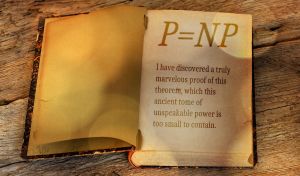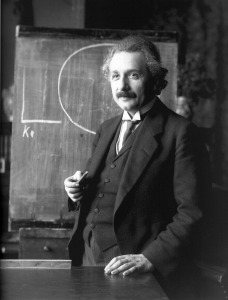5. Battle Soviets and Ancient Aliens
 “The Time Traders” cover art from ISFDB.
“The Time Traders” cover art from ISFDB.
Even though the Cold War ended over a quarter of a century ago, westerners of ahem a certain age will clearly remember the constant threat of nuclear annihilation at the hands of the Communists. What could be more frightening, then, than a Soviet project to travel back in time 4000 years, to alter the course of history?
In Andre Norton’s The Time Traders (and its follow-on novels), members of Operation Retrograde face exactly this prospect. Over the course of the novel, protagonists Ross and Ashe must befriend the locals, discover the truth about the destruction of a US base in prehistoric Britain, escape a team of Soviets, and ultimately evade bald aliens who are also involved in events of the period.
As if Soviet troops or hostile aliens alone wouldn’t be enough to deal with…
4. Go Dinosaur Hunting

In Ray Bradbury’s A Sound of Thunder, a company called Time Safari Inc. offers a once-in-a-lifetime safari expedition. Travel back in time for a chance to hunt a T. Rex. Don’t worry… they’ve already traced its history to make sure you’re shooting it just before it would’ve died anyway, and a floating walkway prevents you from stepping on anything and changing the course of history.
No, you can’t have the Tyrannosaur head mounted for your wall, but this outdoor safari will make your trek into the Cretaceous unforgettable.
Just don’t panic and step off of the walkway, or you’ll learn the true meaning of butterfly effect…
3. Kill Hitler

If there is one thing most time travel stories seem to agree upon, it’s that if you can travel back in time and kill one person, it should be Hitler.
But as with all things temporal, the big question is when? Too late, as in the XKCD comic above, and your assassination is ineffective. Too early, as was once seen in an episode of the (new) Outer Limits, and some other monster will simply fill his place.
WikiHistory, by Desmond Warzel, has another take on this time travel cliché. Time travel in this story is so commonplace that edits are tracked Wikipedia-style. The one rule that each editor breaks (to the annoyance of one of the WikiHistory editors) is that no one is allowed to kill Hitler.
In the words of WikiHistory editor SilverFox316: “Permit me to sum it up and save you the trouble: no Hitler means no Third Reich, no World War II, no rocketry programs, no electronics, no computers, no time travel. Get the picture?”
2. Build an Oracle Machine
 This possibility comes from an unlikely source: a spoof/homage named Harry Potter and the Methods of Rationality. In chapter 17, Harry Potter decides to use time travel for a purpose that could excite only a computer scientist: solving NP-problems in constant time.
This possibility comes from an unlikely source: a spoof/homage named Harry Potter and the Methods of Rationality. In chapter 17, Harry Potter decides to use time travel for a purpose that could excite only a computer scientist: solving NP-problems in constant time.
His plan? Harry Potter is given the number 181,429 and told that it is the product of two three-digit prime numbers. He will loop through all possible pairs of prime factors, sending the result back in time to the start of the experiment, until he factorizes that number and the time loop stabilizes.
Harry expects that this will result in him receiving the two prime factors of 181,429 in zero perceived time. If this sounds like a dull application, keep in mind that Harry has effectively invented an oracle machine, and broken asymmetric keypair cryptography.
The actual results are a little more frightening:
Harry took Paper-2 in his trembling hand, and unfolded it.
Paper-2 said in slightly shaky handwriting:
DO NOT MESS WITH TIME
Harry wrote down “DO NOT MESS WITH TIME” on Paper-1 in slightly shaky handwriting, folded it neatly, and resolved not to do any more truly brilliant experiments on Time until he was at least fifteen years old.
To the best of Harry’s knowledge, that had been the scariest experimental result in the entire history of science.
I wonder if it was actually a dog-latin curse? NON MOLESTERE TEMPUS
Honorable Mention: Fail at Everything and Die
Usually we expect someone with modern technology and know-how will fare pretty well in the past. A modern soldier armed with an automatic rifle should make quick work of a Roman infantry unit. A chemist should impress medieval alchemists with his knowledge of chemical reactions and metallurgy.
In Poul Anderson’s The Man Who Came Early, the protagonist thinks much the same… but quickly learns otherwise. A Cold War-era American soldier stationed in Iceland falls back through time to the 10th century.
With his engineering knowledge, and knowledge of the Icelandic language, he expects to make sweeping and impressive changes. However, he learns a quick lesson in logistics, finding that the period lacks the infrastructure and industry needed for modern manufacturing. Nor are the locals impressed by his civil engineering knowledge, dismissing his plans as impractical, and ultimately coming to regard him as useless.
He likewise has trouble integrating into a society where jobs come through apprenticeship from a young age, where there is no concept of central government, and wrongs are settled by revenge killings. When he runs out of ammunition for his service weapon, he loses his only leverage against a clan whom he has offended.
If it’s any consolation, he dies a heroic death and finds honor posthumously.
1. Leave your Mark on History
What fun is time travel if you can’t brag about it? That’s what researcher George Kilroy thought in Isaac Asimov’s The Message. An academic from the 30th century sent to study World War II, George finds himself caught up in “an intense kind of life forever gone from the world of the thirtieth century”.
Though he is supposed to be merely an observer, George cannot resist leaving a sign of his presence. If you know Asimov’s writing and noticed George’s last name, you’ve likely already guessed the titular message.

What would you do with a time machine? Let me know in the comments.



 Einstein died two hundred years before you were born?”
Einstein died two hundred years before you were born?”
 “The Time Traders” cover art from
“The Time Traders” cover art from 

 This possibility comes from an unlikely source: a spoof/homage named Harry Potter and the Methods of Rationality. In
This possibility comes from an unlikely source: a spoof/homage named Harry Potter and the Methods of Rationality. In 



